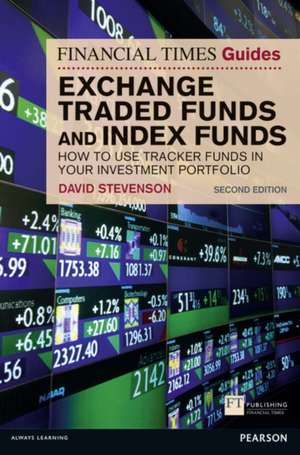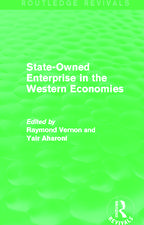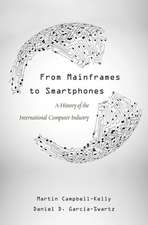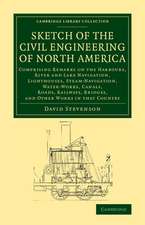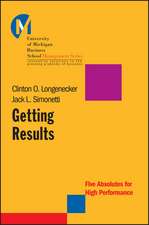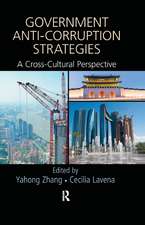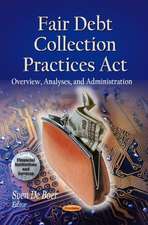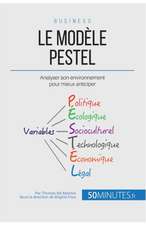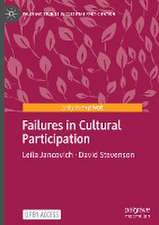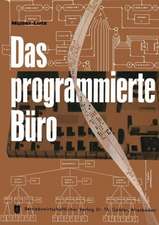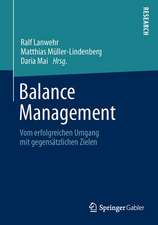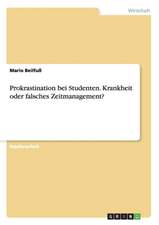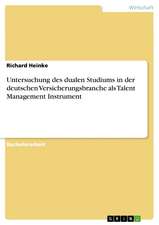Financial Times Guide to Exchange Traded Funds and Index Funds, The: Financial Times Series
Autor David Stevensonen Limba Engleză Paperback – 23 aug 2012
The second edition of this book attempts to answer this debate and is the indispensable bible on trackers for professional advisers and serious private investors.
This new edition also features a chapter based around the theme of Due Diligence and a new chapter on How to use ETFs and Index Funds for theLong-term, as well as a new Jargon busting section and a-new appendix looking at new ideas beginning to emerge.
Din seria Financial Times Series
-
 Preț: 216.04 lei
Preț: 216.04 lei -
 Preț: 230.69 lei
Preț: 230.69 lei -
 Preț: 110.12 lei
Preț: 110.12 lei -
 Preț: 111.74 lei
Preț: 111.74 lei -
 Preț: 118.56 lei
Preț: 118.56 lei -
 Preț: 250.70 lei
Preț: 250.70 lei -
 Preț: 192.77 lei
Preț: 192.77 lei - 19%
 Preț: 466.81 lei
Preț: 466.81 lei -
 Preț: 124.92 lei
Preț: 124.92 lei -
 Preț: 139.86 lei
Preț: 139.86 lei -
 Preț: 94.22 lei
Preț: 94.22 lei -
 Preț: 117.34 lei
Preț: 117.34 lei -
 Preț: 132.99 lei
Preț: 132.99 lei - 23%
 Preț: 637.67 lei
Preț: 637.67 lei -
 Preț: 263.77 lei
Preț: 263.77 lei -
 Preț: 133.26 lei
Preț: 133.26 lei -
 Preț: 208.23 lei
Preț: 208.23 lei -
 Preț: 133.04 lei
Preț: 133.04 lei -
 Preț: 109.53 lei
Preț: 109.53 lei -
 Preț: 117.60 lei
Preț: 117.60 lei -
 Preț: 170.39 lei
Preț: 170.39 lei -
 Preț: 173.61 lei
Preț: 173.61 lei -
 Preț: 241.24 lei
Preț: 241.24 lei -
 Preț: 164.56 lei
Preț: 164.56 lei -
 Preț: 224.30 lei
Preț: 224.30 lei -
 Preț: 266.12 lei
Preț: 266.12 lei -
 Preț: 133.18 lei
Preț: 133.18 lei -
 Preț: 231.50 lei
Preț: 231.50 lei -
 Preț: 146.70 lei
Preț: 146.70 lei -
 Preț: 118.38 lei
Preț: 118.38 lei -
 Preț: 232.07 lei
Preț: 232.07 lei -
 Preț: 132.88 lei
Preț: 132.88 lei -
 Preț: 230.78 lei
Preț: 230.78 lei -
 Preț: 268.39 lei
Preț: 268.39 lei -
 Preț: 132.53 lei
Preț: 132.53 lei -
 Preț: 175.13 lei
Preț: 175.13 lei -
 Preț: 172.35 lei
Preț: 172.35 lei -
 Preț: 167.06 lei
Preț: 167.06 lei -
 Preț: 195.46 lei
Preț: 195.46 lei -
 Preț: 124.71 lei
Preț: 124.71 lei -
 Preț: 232.96 lei
Preț: 232.96 lei -
 Preț: 249.54 lei
Preț: 249.54 lei -
 Preț: 315.59 lei
Preț: 315.59 lei -
 Preț: 80.66 lei
Preț: 80.66 lei -
 Preț: 117.84 lei
Preț: 117.84 lei -
 Preț: 122.62 lei
Preț: 122.62 lei -
 Preț: 132.97 lei
Preț: 132.97 lei -
 Preț: 312.90 lei
Preț: 312.90 lei -
 Preț: 251.10 lei
Preț: 251.10 lei
Preț: 250.29 lei
Nou
47.90€ • 49.82$ • 39.54£
Carte disponibilă
Livrare economică 24 martie-07 aprilie
Livrare express 07-13 martie pentru 43.46 lei
Specificații
ISBN-10: 0273769405
Pagini: 504
Ilustrații: Illustrations
Dimensiuni: 156 x 234 x 26 mm
Greutate: 0.76 kg
Ediția:2 ed
Editura: Pearson Education
Seria Financial Times Series
Notă biografică
David Stevensonis a columnist for the Financial Times Weekend edition and authors the Adventurous Investor section where he writes about everything from investing in Mongolia through to using ETFs in your portfolio. He's also a columnist for the Investors Chronicle (based around his SIPP) and before that was a columnist for Citywire. David writes extensively about ETFs for the FT and has developed a series of Master Portfolios that make use of index tracking funds for the Investors Chronicle.
Cuprins
INTRODUCTION - By Matthew Vincent, FT CHAPTER 1 - Investing 2.0 The Revolution Begins * Decline of the stockpicker and now the decline of active fund manager * Need to emphasize cost in this low return world * Investors waking to the reality that they have to diversify especially after bear markets * The rise of asset class investing, related to but separate from ETfs and index funds * The rise of the dreaded term beta... CHAPTER 2 - A BIT OF THEORY * Where it all came from academically. The academic revolt* The efficient markets theory* The fundamentalists wade in* The first ETF structures and index funds. The legendary John Bogle and the Vanguard Phenomena CHAPTER 3 - WHAT ARE INDEX OR TRACKER FUNDS? * Index mutual funds and how they developed from these into these...* Exchange Traded funds, US Style* European ETFs - the rise of the swap* ETNs in the US and certificates in Europe* ETCs (commodities) and synthetic ETFs* The mechanics - full replication, partial replication, fully synthetic replication* Comparing ETFs vs traditional mutual funds vs index mutual funds* Advantages of different structures and the regulatory structure* New innovations - inverse ETFs, multi-ETF portfolios, actively managed ETFs CHAPTER 4 - THE FIDDLY DETAIL...RISKS, CAVAETS and the INIDICES * What to watch out for - premiums/discounts, tax complications, tracking error, charging (some are expensive - the 1% rule)* Counter Party Risk * Why the index matters - not all indices created equally. Some are too concentrated, carry currency risks, aren't very liquid, and some are just pointless CHAPTER 5 - THE RISE OF THE FUNDAMENTALISTS Guest writer - Rob Davies, fund manager of the Munro Fund, a fundamental index fund * The academic theory surrounding fundamental indexing * Does it work ? The results so far* How to implement it via a fund - black boxes, dividends and the measures used* Will it work in the future - might value investing be dead ? CHAPTER 6 - BIG THEME INVESTING AND INDEX FUNDS Guest Writer - Stephen Barber, Head of Research at Selftrade * Momentum investing works and particularly a focus on big themes, big structural changes* Emerging Markets* Alternative Assets* New Energy and Green markets* Infrastructure and utilities* Commodities CHAPTER 7 - RUNNING A PORTFOLIO : SOME BASICS Guest Writer - James Norton, Head of investment at Evolve Financial Planning * A passive portfolio - why it matters vs Active* Buy and Hold* Asset Allocation explained - correlation and diversification* Inflation* Income investing* Long Term returns ?* The GlidePath CHAPTER 8 - ACTIVE PORTFOLIOS USING ETFS Guest Writer - Mark Glowrey, Investors Intelligence * How to combine ETFs into an active portfolio using technical analysis* The measures sued* Running the portfolio CHAPTER 9 - PUTTING IT ALL TOGETHER INTO A PORTFOLIO THAT WORKS FOR YOU ! * Asset Class Investing* Value vs Growth vs Momentum - all work but difficult to capture these strategies* Importance of international diversification* Lazy Portfolios and why they're so useful* The idea behind building your own MASTER PORTFOLIOS* Lifeycle Investing* Our MASTER PORTFOLIOS - the assumptions* ULTRA LOW RISK INCOME portfolio* LOW RISK portfolio* ABSOLUTE RETURNS portfolio* ADVENTUROUS HIGH RISK portfolio* GLOBAL GROWTH portfolio* CHAPTER 10 - THE ESSENTIAL TOP 30 * Our top 30 funds that should form the building blocks of any portfolio over the long term* BGI data on the growth of the ETF sector and their analysis* Glossary
Descriere
Since the first edition of The Financial Times Guide to ETFs was published in 2009, the number of ETFs in issue has doubled and ETFs are now common both on investor platforms and increasingly amongst financial advisors. This massive increase in demand has highlighted an urgent debate - just how dangerous are ETFs and how much do investors and advisers understand about the structure of the index tracker?
The second edition of this book attempts to answer this debate and is the indispensable bible on trackers for professional advisers and serious private investors.
This new edition also features a chapter based around the theme of Due Diligence and a new chapter on How to use ETFs and Index Funds for theLong-term, as well as a new Jargon busting section and a-new appendix looking at new ideas beginning to emerge.
